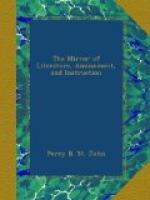As the extreme ignorance of the age made deeds or writings very rare, the county or hundred courts were the places where the most remarkable civil transactions were finished. Here testaments were promulgated, slaves manumitted, bargains of sale concluded; and sometimes for greater security, the most remarkable of these deeds were inserted in the blank leaves of the parish Bible, which thus became a register too sacred to be falsified. It was not unusual to add to the deed an imprecation on all such as should be guilty of that crime.
The laws of Alfred enjoin, that if any one know that his enemy or agressor, after doing him an injury, resolves to keep within his own house and his own lands, he shall not fight him till he require compensation for the injury. If he be strong enough, he may besiege him in his house for seven days without attacking him, and if the agressor be willing, during that time to surrender himself and his arms, his adversary may detain him thirty days; but is compelled afterwards to restore him safe to his friends, and be content with the compensation.
The price of the King’s head or his weregild, as it was then called, was by law, 30,000 thrismas, near L1,300. of our present money. The price of the prince’s head was 15,000 thrismas; a bishop’s or alderman’s HEAD (quere, ought not the STOMACH to have been the part thus valued?) was valued at 8,000; a sheriff’s, 4,000; a thane’s, or clergy-man’s, 2,000; a ceorles, or husband-man’s, 266. It must be understood that when a person was unwilling, or unable to pay the fine, he was outlawed, and the kindred of the deceased might punish him as they thought proper.
Gervase, of Tilbury, says, that in Henry the First’s time, bread sufficient for 100 men, for a day, was rated at THREE SHILLINGS, or a shilling of that age.
By the laws of Ethelbert, any one who committed adultery with his neighbour’s wife, was obliged to pay him a fine, AND BUY HIM ANOTHER WIFE.
The tenants in the King’s demesne lands, in the reign of Henry II., were compelled to supply, GRATIS, the court with provisions and carriages, when the King went into any of the counties. These exactions were so grievous, and levied in so licentious a manner, that at the approach of the court, the farmers often deserted their houses, and sheltered themselves and families in the woods, from the insults of the King’s retinue.
John Baldwin held the manor of Oterasfree, in Aylesbury, of the King, in soccage, by this service of finding litter for the King’s bed, viz. in summer, grass or herbs, and two grey geese; and in winter, straw, and three eels, throughout the year, if the King should come thrice in the year to Aylesbury.




